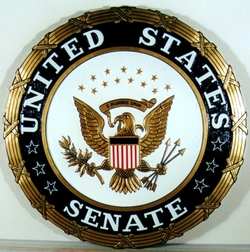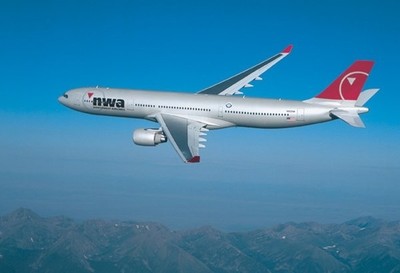Northwest Responds To Claims Of Unfair Advantage
 The US Senate is working
hard to resolve the ongoing dispute over how airlines are to repay
their pensions before the chamber is set to recess for the month at
the end of this week, according to news reports.
The US Senate is working
hard to resolve the ongoing dispute over how airlines are to repay
their pensions before the chamber is set to recess for the month at
the end of this week, according to news reports.
"I think that will be taken care of," Georgia Republican Johnny
Isakson, one of the senators involved in negotiating the bill's
airline provisions, told reporters. Isakson also predicted the bill
would "absolutely, without question," be passed unchanged before
the recess.
As Aero-News reported
Wednesday, senators from states that are home to
airlines such as American and Continental had voiced objections to
the 900-page bill, which they say gives an unfair advantage to
carriers that choose to freeze their plans instead of allowing
benefits to continue to accrue.
The bill is targeted specifically at bankrupt carriers Northwest
and Delta, which under the bill would have 17 years to repay their
respective funding gaps -- versus seven years for carriers that
have opted to continue their plans.
The bill has already passed the House, and if approved by the
Senate would next go to the president for approval.
Even if the bill is passed, however, it does not necessarily
mean the law is then cast in stone... as Isakson hinted some
"technical" changes in the legislation could be made when Congress
reconvenes in September, with more involved changes waiting to be
acted on "somewhere down the line."
Senate Majority Leader Bill Frist opposes any change to the
legislation, as any changes would need to go back to the House for
approval, or at least to joint committee.

Reuters reports airlines that do not freeze their pensions would
be given a total of 10 years to reach full funding... but would
also get a less-generous interest rate on which to calculate future
benefits -- a move Texas Republican Senator John Cornyn called
unfair to airlines that have managed to stay out of bankruptcy
court.
Northwest Responds To Senators' Claims
This week, Northwest Airlines Media Relations Director Kurt
Ebenhoch issued the following statement to Aero-News, responding to
charges that the pension bill gives an unfair advantage to some
airlines:

There is no competitive issue in the airline provision of the
bill. The bill clearly does not give one airline an advantage or
disadvantage over another. The airline section of the bill is not
based on specific airlines – it is based on whether an
airline's pension plans are frozen or ongoing.
All airlines have access to the various provisions of the bill
and can choose which option they prefer. The reasons for the
different options is because the frozen pension plan option limits
and protects the liability of Pension Benefit Guaranty Corporation
(PBGC) and potentially taxpayers, and the ongoing plan option does
not.
The bill also provides special relief for airlines that choose
to continue their plans, by waiving the Deficit Reduction
Contribution (DRC) requirements for two more years and then
allowing those airlines to amortize over ten years.
Any airline with pension plans -- including American and
Continental -- is eligible for either option based on what
they have chosen to do with their plans. In fact, a carrier such as
Continental is eligible to take advantage of both provisions, as
some of their pension plans are frozen and others are not.
Continental's pilot plan was frozen last year.
 ANN's Daily Aero-Linx (05.06.25)
ANN's Daily Aero-Linx (05.06.25) ANN's Daily Aero-Term (05.06.25): Ultrahigh Frequency (UHF)
ANN's Daily Aero-Term (05.06.25): Ultrahigh Frequency (UHF) ANN FAQ: Q&A 101
ANN FAQ: Q&A 101 Classic Aero-TV: Virtual Reality Painting--PPG Leverages Technology for Training
Classic Aero-TV: Virtual Reality Painting--PPG Leverages Technology for Training Airborne 05.02.25: Joby Crewed Milestone, Diamond Club, Canadian Pilot Insurance
Airborne 05.02.25: Joby Crewed Milestone, Diamond Club, Canadian Pilot Insurance





